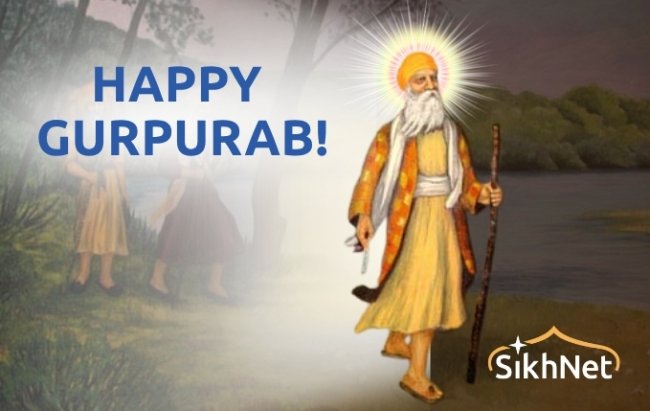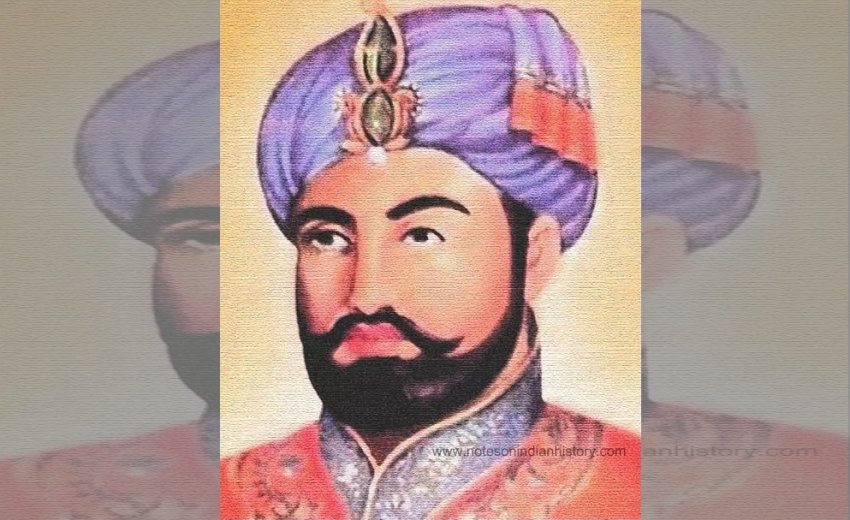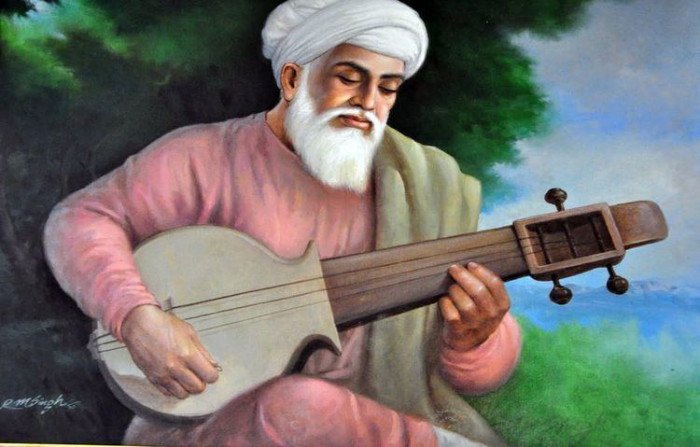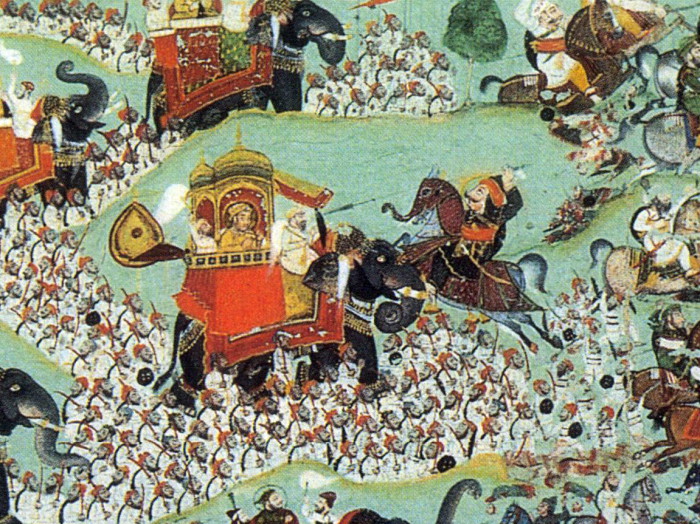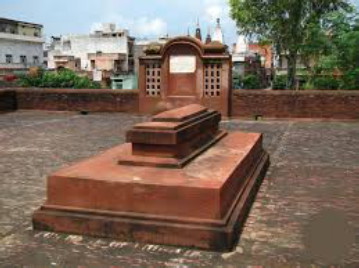Daulat Khan Lodi (1458-1526) is an interesting character from the Sikh perspective, as he was the first and the only employer of Guru Nanak Dev Ji’s services, as his Store Keeper of the state granary.
Bhai Gurdas in his Vaar 11, listed the eminent Sikhs of Guru Nanak Dev Ji’s time, had included the name of Daulat Khan Lodi.
This piqued my curiosity to further explore about the life of Daulat Khan Lodi, who from the employer had become an elite disciple.
Bhai Gurdas Ji’s words in the Vaar are:
“ਦਉਲਤ ਖਾਂ ਲੋਦੀ ਭਲਾ ਹੋਆ ਜਿੰਦ ਪੀਰੁ ਅਬਿਨਾਸੀ॥”
“Dhaulat khan lodi bhalaa hoaa ji(n)dh peer abinaasee.”
(Bhai Gurdas, Vaar 11.13)Translation: Daulat Khan Lodi was a nice person who later came to be known as a living pir, the spiritualist.
The designation of Nawab Daulat Khan Lodi as living pir by Bhai Gurdas piqued my curiosity to learn more about him. Unfortunately there is not much written documentation available to shed light on his life. His father’s name was Tatar Khan, who had received Sultanpur as his estate (jagir) from General Sayyad Khijr Khan (reigned 1414 -1421).
Let us first start with the known incidents associated with Guru Nanak Dev Ji first in Sultanpur. Then we will explore some details which are not common knowledge.
Guru Ji taking employment as Modi
During those days the farmers used to pay their revenue in kind and not in cash and the Government servants were similarly paid in kind. Modi was responsible for keeping an account of all in-coming and out-going provisions. He was authorized to sell the surplus grains in the market and deposit the cash in the treasury. In fact, the whole of Government machinery was dependent on the efficient performance of the Modi (Store Keeper). Honesty of the person; fair in dealing with people; administration and its staff were prerequisites for the position of Modi. Daulat Khan the Afghan noble was the governor of Jalandhar Doab with Sultanpur, a town in present day Kapurthala district, as his capital. One of his minister, Jai Ram, was married to Guru Nanak`s sister, Nanaki. Jai Ram secured young Nanak employment as keeper of the Nawab's granaries and stores at Sultanpur in November 1494. Guru Nanak applied himself to his duties diligently, impressed everyone with his gentleness and open-handed generosity. Daulat Khan was very pleased with the feedback that he got on the honest working of his new Modi. The Governor of Punjab based in Lahore at that time was his father, Tatar Khan Lodi.
Rumors against Guru Ji and audit
Within short time the honesty, compassionate nature and noble character of Guru Nanak became talk of the town. Guru Ji would be weighing provisions and saying “tera” get into another world. The corrupt employees saw their opportunity to steal had evaporated, so they started rumors against Guru Ji, for squandering the state assets by failing to keep count. Soon the rumors reached Nawab Daulat Khan, who instituted audits to verify the inventory including ledger books. On completion of physical inventory checks made on two different occasions it was established that the store’s inventory and books tallied, and accounts were correct. In fact the state owed money to Guru Nanak Dev Ji.
Even if Nawab Daulat Khan had suspicions based on his past experience, with the previous Modis soon evaporated. Now he had a new found regard for Guru Ji, his Modi. Similarly, the end of year accounts audit did not uncover anything awkward and Nawab’s faith in Guru Ji grew. Still the complaints continued to pour in the ensuing year, but Nawab chose not to pay any heed to them.
The Call
Guru Nanak Dev Ji’s daily morning routine in Sultanpur was to take bath in the river Bein, before he sat in deep meditation under the Ber tree. One day Guru Ji disappeared while bathing in the Bein and reappeared three days later. On the morning of 25th August, 1507 Guru Ji showed up 3.5 KM away and made the graveyard outside Sultanpur as his abode. The news of Guru's survival spread like a wildfire and everyone rushed to the graveyard to witness the spectacle. The first utterance that the Guru Ji made was that 'there is no Hindu and there is no Muslim’. These words were considered as heretical pronouncement, soon reached Nawab. Nawab sent a messenger asking Guru Ji to come to his court. The messenger returned back without Guru Ji.
Finally, after meeting with Guru Ji at the behest of Qazi, Nawab asked Guru Ji that if there is no difference between Hindu and Muslim, then Guru should not have any issue in offering Namaz with them. Guru Ji agreed and went with them inside the mosque. After completion of the prayer Nawab asked Guru Ji why he did not join in the prayer. Guru Ji replied, “Nawab Ji! Whom would have I joined in prayer? You were only physically here, while mentally you were in Kandahar purchasing horses.” Nawab countered, “You could have joined Qazi.” Guru responded, “Dear Nawab! Qazi was mentally looking after new-born filly at home.” Qazi was surprised but acknowledged the fact and clarified, “My mare gave birth to a foal this morning. While performing my prayer I was worrying about my foal falling into the ditch.” Guru Ji said,
“Dear Qazi, only the prayer which is performed with mind and body fully concentrated is accepted at the door of God.” Guru Ji uttered a hymn there defining who is Muslim. On hearing this sublime hymn, Nawab fell at Guru Nanak's feet. Nawab said, “Nanak was a faqir, whose words they did not easily understand.”
Mission Started
The Guru decided not to serve in Modi Khana any longer from thereafter. He had decided to go far and wide to spread his mission of universal brotherhood of Mankind, who had been separated from each other on the basis of status, religion, creed and race. Guru Ji had made momentous decision after hearing his inner voice. After the call, Guru Ji left for his first long journey known as Udasi. When Guru Ji returned back from his first journey in 1515, his first stop was Sultanpur. Guru Ji spent 5 days there meeting his beloved sister Bebe Nanaki and Bhai Jai Ram. Daulat Khan came to visit with Guru Ji and impressed upon him to stay back in Sultanpur. The Nawab, in an outburst of affectionate admiration, offered him a sacrifice of his authority and estate. Guru Ji, however, had no interest in temporal possessions. The transformation brought by Guru Ji in Sultanpur has been summed by Bhai Gurdas Ji in one crisp sentence as:
“ਸੁਲਤਾਨੇ ਪੁਰਿ ਭਗਤਿ ਭੰਡਾਰਾ ॥21॥”
“Sulataane pur bhagat bhanddaaraa. 21.” (Bhai Gurdas, Vaar 11.21)Translation: Sultanpur is the treasure house of devotion (and devotees).
But, Guru Ji decided to move on to Talwandi via Lahore to meet his parents. Soon Guru Ji was gone on his second journey, after spending 2 months in Talwandi. After completing the second journey, he returned back to Sultanpur in 1518. Just next day Bebe Nanaki breathed her last, as if she was waiting for return of her brother. Bebe Nanaki had expressed her last wish to Guru Ji that he time has come and she wanted him to preside over her last rites.
Further along unexplored history
In the meantime Daulat Khan had become the governor of Lahore after his father. At the time of Sikandar Lodi's death (1517), he opposed Ibrahim Lodi's accession; subsequently, he remained alienated. Daulat Khan was an uncle of Ibrahim Lodi in relation. He was very pained by the ruthless killing of the innocent unleashed by Ibrahim Lodi upon assuming power. According to S. M. Latif’s book “History of Panjab” on page 245 “….a Faqir whose tenets were different both from Koran & the Vedas, was openly preaching to the people, and the importance which he was assuming might, in the end, prove serious to the state. Guru Nanak was kept in prison for seven months and had to grind corn the whole time.” It is likely that this treatment of Guru Ji had riled Daulat Khan and he staunchly opposed Ibrahim Lodi.
In 1523 Ibrahim Lodi’s suspicions fell on Daulat Khan, governor of Lahore, whom he summoned to Delhi. Fearing for his life, Daulat Khan sent his son Dilawar in his place. This angered Ibrahim, who took Dilawar into a dungeon to show him a number of former nobles who were now hanging from the walls by ropes. Fearing that same fate awaited him, Dilawar fled back to Lahore. After hearing from Dilawar his father decided that his only chance of survival was to ask for help from Babur. So Dilawar was dispatched to Kabul, where he was able to win Babur's support.
Daulat Khan jointly with Alam Khan invited Babur to advance into Punjab, and Ibrahim Lodi retaliated by evicting him from Lahore. Babur left for Lahore in 1524. As he approached Lahore it became clear to him that Daulat Khan was no longer in command in the city. On his arrival at Lahore, he faced Ibrahim Lodi’s Army and he routed them in the battle, and then set the city on fire. Babur entered the walled city in triumph, burning some of the bazaars during a four day long stay. Babur after placing Alam Khan, Ibrahim’s rebel uncle as the governor, continued to Dipalpur. In 1524, Daulat Khan met Babur at Dipalpur but soon there was a rift between them over sharing the territory in the Punjab. Babur offered Jullundur and Sultanpur to Daulat Khan and not Lahore, which he did not accept. He went into hiding. However, Alam Khan was overthrown and he fled to Kabul. Alam Khan joined hands with Daulat Khan Lodi and with Babur’s support leading 30,000 troops, fought Ibrahim Lodi at Delhi but was defeated.
In 1526, when Babur again advanced into the Punjab, Daulat Khan fled to Milwat, north of Lahore. Babur laid siege of Milwat as a result Daulat Khan submitted to him. Babur met Ibrahim Lodi on 21st April, 1526 in the first battle of Panipat, and, by defeating him was able to capture Delhi and Agra, laying the foundation of Mughal rule in India.
This was also the end of Lodi dynasty’s rule with the death of Ibrahim Lodi at the battlefield of Panipat. The historic fight lasted less than three hours is a testament to strategic planning, execution with the effective use of gunpowder by Babur.
Babur appointed Mir Abdul Aziz as the governor of Lahore. Daulat Khan was sent to Bhera and he died on the way in the same year. He was a man of refined literary taste, whose personal library was seized by Babur.
Apparently the act of Daulat Khan Lodi inviting Babur may be borne out of desire for preservation of his own fiefdom, but its outcome was tectonic as it brought about a historic change. The new Mughal dynasty kingdom ruled India for around 200 years.
References:
- Singh, Satbir. Baliyo Chirag. Life of Guru Nanak Dev Ji (In Punjabi) New Book Co. (2004)
- Singh, Prof. Kartar. Guru Nanak Dev: Life and Teachings. Lahore Book shop (2008)
- Grewal, J. S. Guru Nanak in History. Panjab University (1998)
- Singh, Prof. Sahib. Guru Nanak Dev and his Teachings. Translated by S. Dalip Singh. Lok Sahit Prakashan (2002)
- Jagdev, Santokh Singh. Bed Time Stories-2. Sikh Missionary Resource Center (1996)
- https://medieval_india.enacademic.com/139/Daulat_Khan_Lodi
- https://www.thehindu.com/children/rise-of-an-empire/article18178670.ece
- http://www.historyofwar.org/articles/battles_lahore_1524.html
- https://www.sikhiwiki.org/index.php/Daulat_Khan
- https://www.thesikhencyclopedia.com/muslims-rulers-and-sufi-saints/daulat-khan-lodhi-nawab
- https://en.wikipedia.org/wiki/Daulat_Khan_Lodi
